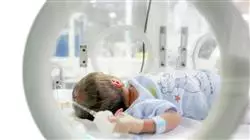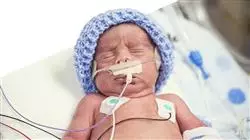University certificate
The world's largest faculty of medicine”
Introduction to the Program
Thanks to this Hybrid professional master’s degree, you will have access to advanced specialization, facilitating your continuous updating of knowledge in a medical field in constant evolution, such as Neonatology”

Technological advances in Neonatology, such as intelligent incubators and continuous monitoring systems, have significantly improved the neonatal survival rate worldwide. At the same time, recent studies highlight that the global rate of prematurity remains high, affecting approximately 10% of births, which underlines the importance of highly specialized Neonatal Intensive Care Units (NICU).
This is how this Hybrid professional master’s degree was born, thanks to which doctors will investigate neonatal assessment techniques to detect complications from birth, delving into the physiological transition of the neonate. They will also analyze the safety and effectiveness of admission protocols in neonatal units, including the management of neonatal transport and thermal control strategies to prevent complications such as Hypothermia.
Likewise, the physiopathology of Neonatal Respiratory Diseases will be analyzed, together with the application of respiratory assistance modalities, such as Mechanical and Non Invasive Ventilation. In this sense, professionals will master Neonatal Resuscitation techniques, evaluating their impact on premature and low weight neonates. In addition, critical conditions such as Neonatal Shock and Sepsis will be examined, together with Congenital Heart Disease.
Finally, specialized areas will be included, such as Neurological, Digestive and Hematological Disorders in neonates, where complex pathologies such as Hypoxic-Ischemic Encephalopathy, Necrotizing Enterocolitis and Hyperbilirubinemia will be addressed. Likewise, experts will be updated on the immunological development of the newborn and its relationship with Perinatal Infections.
Therefore, TECH has implemented a comprehensive program, which will be divided into two distinct sections. First, graduates will be able to study the theory completely online, only needing an electronic device with an Internet connection, with the support of the revolutionary Relearning learning methodology, consisting of the reiteration of key concepts for an optimal assimilation of the contents. Ultimately, the program includes a practical stay of 3 weeks in a prestigious hospital center.
"Make the most of this opportunity to learn about the latest advances in this subject to apply it to your daily practice"
This Hybrid professional master’s degree in Neonatology contains the most complete and up-to-date scientific program on the market. Its most notable features are:
- Development of more than 100 clinical cases presented by medicine professionals with expertise in Neonatology and university professors with extensive experience in newborn patients.
- The graphic, schematic, and practical contents with which they are created, provide scientific and practical information on the disciplines that are essential for professional practice.
- Patient assessment and monitoring, the latest international recommendations for life support maneuvers, etc.
- Comprehensive systematized action plans for the main pathologies in Neonatology.
- Presentation of practical workshops on diagnostic and therapeutic techniques in neonatal patients.
- An algorithm-based interactive learning system for decision-making in the clinical situations presented throughout the course.
- Practical clinical guides on approaching different pathologies
- All of this will be complemented by theoretical lessons, questions to the expert, debate forums on controversial topics, and individual reflection assignments
- Content that is accessible from any fixed or portable device with an Internet connection.
Furthermore, you will be able to carry out a clinical internship in one of the best hospital centers
Face-to-face internships will guarantee the acquisition of specialized clinical skills in neonatal care, favoring a direct immersion in the management of real cases”
In this proposed Master's Degree, of a professionalizing nature and blended learning modality, the program is aimed at updating medical professionals who perform their functions in Neonatal Units, and who require a high level of qualification. The contents are based on the latest scientific evidence, and oriented in a didactic way to integrate theoretical knowledge into Doctor practice, and the theoretical-practical elements will facilitate the updating of knowledge and allow decision making in patient management.
Thanks to the multimedia content, developed with the latest educational technology, Medicine professionals will benefit from contextual learning, i.e., a simulated environment that will provide immersive learning programmed to specialize in real situations. This program is designed around Problem-Based Learning, whereby the physician must try to solve the different professional practice situations that arise during the course. For this purpose, students will be assisted by an innovative interactive video system created by renowned and experienced experts.
You will delve into the physiological and anatomical adaptations that the neonate undergoes as it moves from intrauterine to extrauterine life, thanks to an extensive library of innovative multimedia resources"

You will be specialized in techniques to ensure survival and improve short- and long-term outcomes in babies with respiratory problems or who are born with low birth weight problems"
Why study at TECH?
TECH is the world’s largest online university. With an impressive catalog of more than 14,000 university programs available in 11 languages, it is positioned as a leader in employability, with a 99% job placement rate. In addition, it relies on an enormous faculty of more than 6,000 professors of the highest international renown.

Study at the world's largest online university and guarantee your professional success. The future starts at TECH”
The world’s best online university according to FORBES
The prestigious Forbes magazine, specialized in business and finance, has highlighted TECH as “the world's best online university” This is what they have recently stated in an article in their digital edition in which they echo the success story of this institution, “thanks to the academic offer it provides, the selection of its teaching staff, and an innovative learning method aimed at educating the professionals of the future”
A revolutionary study method, a cutting-edge faculty and a practical focus: the key to TECH's success.
The most complete study plans on the university scene
TECH offers the most complete study plans on the university scene, with syllabuses that cover fundamental concepts and, at the same time, the main scientific advances in their specific scientific areas. In addition, these programs are continuously being updated to guarantee students the academic vanguard and the most in-demand professional skills. In this way, the university's qualifications provide its graduates with a significant advantage to propel their careers to success.
TECH offers the most comprehensive and intensive study plans on the current university scene.
A world-class teaching staff
TECH's teaching staff is made up of more than 6,000 professors with the highest international recognition. Professors, researchers and top executives of multinational companies, including Isaiah Covington, performance coach of the Boston Celtics; Magda Romanska, principal investigator at Harvard MetaLAB; Ignacio Wistumba, chairman of the department of translational molecular pathology at MD Anderson Cancer Center; and D.W. Pine, creative director of TIME magazine, among others.
Internationally renowned experts, specialized in different branches of Health, Technology, Communication and Business, form part of the TECH faculty.
A unique learning method
TECH is the first university to use Relearning in all its programs. It is the best online learning methodology, accredited with international teaching quality certifications, provided by prestigious educational agencies. In addition, this disruptive educational model is complemented with the “Case Method”, thereby setting up a unique online teaching strategy. Innovative teaching resources are also implemented, including detailed videos, infographics and interactive summaries.
TECH combines Relearning and the Case Method in all its university programs to guarantee excellent theoretical and practical learning, studying whenever and wherever you want.
The world's largest online university
TECH is the world’s largest online university. We are the largest educational institution, with the best and widest online educational catalog, one hundred percent online and covering the vast majority of areas of knowledge. We offer a large selection of our own degrees and accredited online undergraduate and postgraduate degrees. In total, more than 14,000 university degrees, in eleven different languages, make us the largest educational largest in the world.
TECH has the world's most extensive catalog of academic and official programs, available in more than 11 languages.
Google Premier Partner
The American technology giant has awarded TECH the Google Google Premier Partner badge. This award, which is only available to 3% of the world's companies, highlights the efficient, flexible and tailored experience that this university provides to students. The recognition as a Google Premier Partner not only accredits the maximum rigor, performance and investment in TECH's digital infrastructures, but also places this university as one of the world's leading technology companies.
Google has positioned TECH in the top 3% of the world's most important technology companies by awarding it its Google Premier Partner badge.
The official online university of the NBA
TECH is the official online university of the NBA. Thanks to our agreement with the biggest league in basketball, we offer our students exclusive university programs, as well as a wide variety of educational resources focused on the business of the league and other areas of the sports industry. Each program is made up of a uniquely designed syllabus and features exceptional guest hosts: professionals with a distinguished sports background who will offer their expertise on the most relevant topics.
TECH has been selected by the NBA, the world's top basketball league, as its official online university.
The top-rated university by its students
Students have positioned TECH as the world's top-rated university on the main review websites, with a highest rating of 4.9 out of 5, obtained from more than 1,000 reviews. These results consolidate TECH as the benchmark university institution at an international level, reflecting the excellence and positive impact of its educational model.” reflecting the excellence and positive impact of its educational model.”
TECH is the world’s top-rated university by its students.
Leaders in employability
TECH has managed to become the leading university in employability. 99% of its students obtain jobs in the academic field they have studied, within one year of completing any of the university's programs. A similar number achieve immediate career enhancement. All this thanks to a study methodology that bases its effectiveness on the acquisition of practical skills, which are absolutely necessary for professional development.
99% of TECH graduates find a job within a year of completing their studies.
Hybrid Professional Master's Degree in Neonatology
Neonatology is a crucial medical specialty that focuses on the care and treatment of newborns, especially those requiring specialized care. Given the advancement in techniques and technologies for neonatal care, professionals in this area must be up to date with the latest developments to provide the best possible care. In this context, TECH Global University presents the Hybrid Professional Master's Degree in Neonatology, designed to offer an ideal combination of online study and face-to-face practice. This program is oriented to those professionals who seek to deepen their knowledge in the management of neonatal diseases and perfect their skills in the care of newborns in a highly specialized environment. This specialization provides in-depth preparation in key areas including prematurity management, advanced neonatal ventilation, and neonatal intensive care unit care and nutrition techniques.
Advances in specialized neonatal care
This program combines the flexibility of online learning and face-to-face interaction with professors and peers in a traditional classroom environment. Therefore, students will have the opportunity to participate in live or online discussions in order to put into practice the knowledge acquired in the classroom. Here, we propose a theoretical-practical journey through various modules that encompass the diagnosis and treatment of common pathologies in newborns such as infections and metabolic disorders. With an innovative approach, participants will have the opportunity to apply their knowledge in real clinical settings, ensuring that they are fully prepared to face the challenges of modern neonatology. This specialization focuses on equipping professionals with the competencies necessary to provide high quality neonatal care and to lead in a field of vital importance to children's health. If you want to learn more, take the decision and register now, we are waiting for you!







